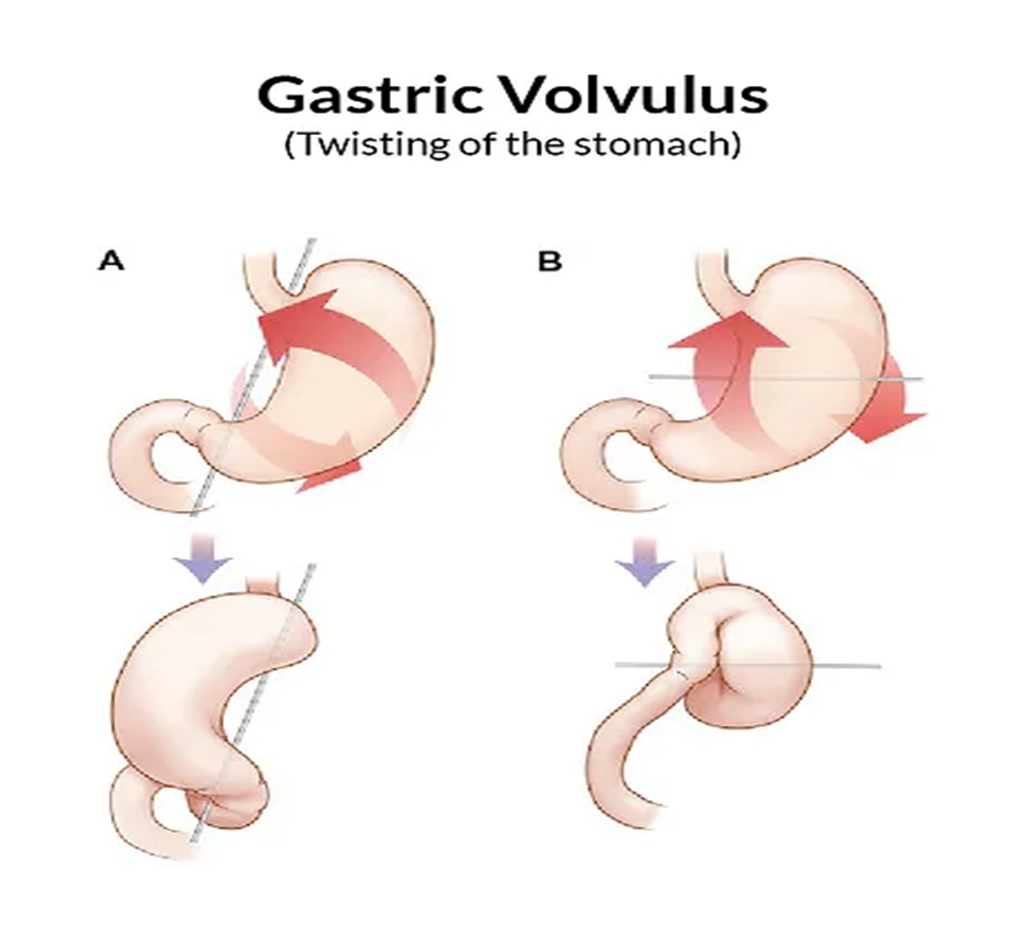In a remarkable medical incident, a 12-year-old girl from Ethiopia presented with severe abdominal pain, which persisted for two agonizing days before she received emergency medical treatment. The cause of her distress was identified as a rare and potentially fatal condition known as gastric volvulus, where the stomach twists on itself by more than 180 degrees, causing her stomach folded inward. This led to extreme tenderness and swelling in her abdomen, hindered her ability to pass stools, and even compromised her breathing.
Stomach Folded Inward: Understanding Gastric Volvulus
Gastric volvulus is a life-threatening condition, with a mortality rate ranging between 30% and 50%. The twisting of the stomach can lead to a complete obstruction, impeding the passage of food, blood, and oxygen flow to and from the stomach. This can cause tissue necrosis and perforations in the stomach wall, resulting in internal bleeding and severe infections, which can exacerbate cardiovascular strain and potentially cause sepsis.
A Rare Diagnosis in a Rare Demographic
First described in 1886, gastric volvulus predominantly affects individuals over 50 or infants under one year old. The total number of reported cases remains in the hundreds globally, highlighting the rarity of this condition. It is frequently associated with paraesophageal hernias, where part of the stomach protrudes through the diaphragm into the chest cavity, often due to congenital abnormalities or traumatic injuries.

In this extraordinary case, the girl’s condition was due to the stomach folding onto itself like a clamshell. This type of gastric volvulus is seen in about one-third of cases and is more common in young children due to laxity in the ligaments that typically anchor the stomach within the abdomen. Specifically, the girl’s stomach was not securely attached to the transverse colon, leading to a dangerous twist.
The Critical Role of Timely Intervention
Diagnosis of gastric volvulus usually relies on imaging techniques like CT scans or X-rays. However, the hospital’s CT scanner was not operational, compelling the medical team to proceed directly to surgery based on clinical assessment. During surgery, they confirmed the diagnosis of gastric volvulus.
The surgical intervention involved untwisting the stomach and securing it to the abdominal wall to prevent a recurrence. In severe cases, nasogastric tubes are used to decompress the stomach, as was necessary for this patient.
A Miraculous Recovery
Remarkably, six days post-surgery, the girl was discharged from the hospital, her life saved by the quick actions and expertise of her medical team. Her case, published on January 13 in the International Journal of Surgery Case Reports, underscores the importance of timely diagnosis and treatment in managing gastric volvulus.
Conclusion
The case of this Ethiopian girl powerfully reminds us of the critical nature of gastric volvulus and the importance of immediate intervention. It also highlights the ingenuity and dedication of medical professionals who save lives despite equipment limitations. For healthcare providers, this rare case serves as a crucial reminder to consider gastric volvulus in patients presenting with acute abdominal pain and respiratory distress, especially when imaging options are limited.
Disclaimer Statement: This information is from a third-party health news channel. The opinions expressed here belong to the respective authors/entities and do not reflect the views of Docquity. Docquity does not assure, endorse, or vouch for any of the content and bears no responsibility for it in any way. It is essential to take all necessary steps to ensure the information and content provided are accurate, current, and verified. Docquity disclaims any express or implied warranties related to the report and its contents.
References
Surgeons save life of child whose stomach folded over on itself [Internet]. Accessed on June 24, 2024. Available from: https://www.livescience.com/health/anatomy/surgeons-save-life-of-child-whose-stomach-folded-over-on-itself
About Docquity
If you need more confidence and insights to boost careers in healthcare, expanding the network to other healthcare professionals to practice peer-to-peer learning might be the answer. One way to do it is by joining a social platform for healthcare professionals, such as Docquity.
Docquity is an AI-based state-of-the-art private & secure continual learning network of verified doctors, bringing you real-time knowledge from thousands of doctors worldwide. Today, Docquity has over 400,000 doctors spread across six countries in Asia. Meet experts and trusted peers across Asia where you can safely discuss clinical cases, get up-to-date insights from webinars and research journals, and earn CME/CPD credits through certified courses from Docquity Academy. All with the ease of a mobile app available on Android & iOS platforms!







